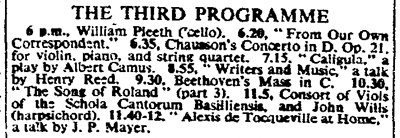The place where our two gardens meetHenry Reed's poem "The Wall," set to music by Professor Emmy van Deurzen. "The Wall" first appeared in The Penguin New Writing, in 1943. Emmy accompanies a bunch of poems with guitar on her YouTube channel, including Dylan Thomas's "Do Not Go Gentle Into That Good Night," and Louis MacNeice's "A Prayer Before Birth" and "Sunlight on the Garden."
Is undivided by a street,
And mingled flower and weed caress
And fill our double wilderness
Among whose riot undismayed
And unreproached, we idly played,
While, unaccompanied by fears,
The months extended into years,
Till we went down one day in June
To pass the usual afternoon
And there discovered, shoulder-tall,
Rise in the wilderness a wall....
|
The Wall
Sheep May Safely GrazeThe Broadview Anthology of Poetry (edited by Herbert Rosengarten and Amanda Goldrick-Jones, 2008) adds an interesting footnote to Reed's "Judging Distances." The lines:
Things only appear to be things.have the following note: 1 Sheep ... grazing An allusion to the Christmas anthem "Sheep May Safely Graze," by J.S. Bach.I never made that connection, before. The Bach piece in question is "Schafe können sicher weiden" (I'm sure you know): The aria, translated from the German: Sheep may safely graze
Writers and MusicHenry Reed gave any number of BBC radio talks during the 1940s and '50s, most of which are lost to time. He is not always given credit in the broadcasting schedules of the day, or if he is, his subject is not always named. Some of his book talks are quoted in publishers' advertisements for novels in contemporary journals and magazines, or he may be quoted by another critic in a print review.
Here we have a record of a talk Reed gave on April 7, 1949, "Writers and Music," from the Times broadcasting schedule:  This talk is mentioned by W.R. Anderson in his "Round About Radio" column in the Musical Times for May, 1949 (p. 161): Henry Reed, talking about 'Writers and Music', was not concerned with this sometimes nagging pre-occupation. One passage of his might well stand as a whimsical P.S. to our Editor's February thought-stirring article 'On Influence and Borrowing', in which vast ground I beg him, and others, to continue digging. Mr. Reed, whose beginning I missed, was, I take it, imagining the lay author's diversion with various fantasies of himself as a musicologist giving out new truths, or controverting the pestilent heresies of pretentious rivals. Reminiscence-hunting can be as futile as fifth-chasing; but we might have a bit of good writing about the real values of 'influences'. There is plenty of room for a good book dealing, more fully than a general history can, with this admittedly fascinating aspect of history. It is not only in theme or harmony that we can detect similarities; there is style, and the sort of overblown oddness that, one might think, was afflicting a clever man like Holst, in the 'Planets': one of the leading cases, to my mind, in which to exhibit both the stirs and depressions of a fin de siècle upthrust of quite irresistible force. Holst, so original in some ways, was a curious case. We should be given more of his best work; but nobody is served by shutting eyes and ears to the astonishing amount of pastiche in those 'Planets'. He was a strange mixture—in that way the most interesting modern English composer. So here we have not only have a record of the time, date, and duration of Reed's talk, but also an ostensible review; and yet I still have no idea what Reed was talking about. Which writers, and what music?
St. Petersburg is More than Twice as Little as MoscowI think Zhopa Novy God (MySpace) is my new favorite Russian festive brass band. Their track, "St. Petersburg is More than Twice as Little as Moscow" (YouTube), defines everything I love about Russian festive brass.
A One, and a Two, and a One-Two-ThreeWho gives a fuck about an "Oxford Comma"? (.mp3), by Vampire Weekend. (Via Steamboats Are Ruining Everything.)
|
|||||||||||||||||||||||||||
|
|
||||||||||||||||||||||||||||







